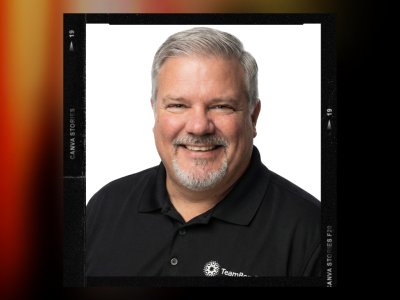STRONG TEAMS DON’T HAPPEN BY CHANCE 
Teaching Power Skills in the Workplace
w/ Laura Sukorokoff

Use the buttons above to listen now.
Transcript - Teaching Power Skills in the Workplace
Rich, Host: On this episode of Team Building Saves the World.
Laura, Guest: Say you’ve got a team of eight people. What would happen if four of them didn’t come to work tomorrow? You don’t get in their way over something like a coffee break. You know, and honestly, I really dislike the term soft skill. It makes them sound fluffy and unimportant.
You don’t have to have them over for Sunday dinner every week. It doesn’t have to be that way.
Rich, Host: Although occasionally, would it hurt?
Rich, Host: Hello, team. It’s me, your old friend, Rich Rinnisland, host of Team Building Saves the World. The show where I speak to thought leaders from around the world discussing variable strategies and tools to help you and your team build a better work environment. And today let’s talk about living on the front lines, the employee engagement and its impact on the rest of the business with the co-founder and chief engagement officer of take-charge learning, , but first I have to share some love with my supporters at TeamBonding.
If your team is ready to experience teamwork, the power of play, then visit TeamBonding.com to learn more. Now team, please join me in welcoming my guest, the author of It’s Not them, It’s You, Why Employees Break Up With Their Managers and What To Do About It Laura Sukorokoff, Laura..
Laure, Guest: It’s nice to see you,
Rich, Host: It’s nice to you too. Please tell me I got that last name, right..
Laura, Guest: You did and I’m gonna i’m going to give you full on props for that because it is many syllables and letters long. So folks who are listening, tt is not an easy name to just nail on the first go around. So Rich, I don’t know. Did you practice it?
Rich, Host: I did I’ll be honest with you before you came on like a good half hour, Sukorokoff….. Sukorokoff… like a like a choo choo train in my head
Laura, Guest: Just to, you know, channel their best Russian accent and you know, kind of like just let me go, you know..
Rich, Host: Don’t tell me to do that, because I will do this. This is something I am good at and will continue to try to do.
Uh, Laura, that’s not what this podcast is about because I don’t need to show that off. Uh, let’s start off by letting everybody know a bit more about you, where you come from and how it was you got started in this industry.
Laura, Guest: Sure. Okay. So let’s just say that it’s a long story that I will shorten into as short as I can.
To begin, where do I come from? Well, I live on Vancouver Island in Canada. off the coast of Vancouver for those of you who know where that is. So it’s a, it’s a, sounds like a small place, but it’s actually a big island. And I live in my own personal version of paradise. So I, I’m in a place called Qualicum Beach.
It’s right there in the name folks. I live at the beach.
Rich, Host: You said beach.
Laura, Guest: I hear the sounds of eagles and sea lions all the time. You know, there are whales that play out in the water here.
Rich, Host: Nice
Laura, Guest: It’s just for me. It is a wonderful place to live, and I’m fortunate because my business is primarily virtual. So that allows me to be able to live in this beautiful part of the world.
And then the other part of your question was, how did I get here? And that is, that’s the long story, which I won’t share all the details with, but I have had a very long career in organizational learning and development. I fell into that career. decades ago. And I have to tell you, I kind of found where I was supposed to be. It was serendipitous.
It was completely a mistake, but it ended up being the most perfect mistake for me. And so I have been working in that field for a long time. I’ve trained a lot of people on a lot of things, but my sweet spot is in the area of soft skills, especially employee engagement. And what I found and this was accidental.
What I found was, you know, over the past few years, it seemed like there were a lot of people coming to me, talking to me about why they wanted to quit their jobs, why they did quit their jobs and, you know, how could I support them? And it was almost like, like they were either, looking for help to get through it, or even if they started by saying, can you help me by sharing with your network or, you know, do you know people who I might get a job with?
It ended up being almost like a little bit of a therapy session. I’m no therapist. But, you know, just this needing to talk to somebody about what they went through with their manager.
Rich, Host: Uh huh.
Laura, Guest: And so, truly, Rich, this started to, to weigh on me and I thought, what is going on here? Like, this is kind of bad.
And I realized that if I put it all together, I had by this point, probably a half a dozen people that all had the same reason for leaving.
Rich, Host: Right.
Laura, Guest: And I kind of started doing some research into it and realized that honestly, managers are the number one people or reason people leave their jobs. They’re also the number one reason people stay in their jobs.
So it’s an interesting thing because you know, if you look at the data, 70 percent of the variants, you know, 70 percent of the reasons why people stay or go boils down to their manager. And I thought this was kind of fascinating. So I. wrote the book, I quit my job, started my companies and have really been digging into this idea of helping managers connect with the people on their teams such that they can support them, that they can guide them, that they could have good relationships and you know what, that they can make work a nice place to be.
So that is for me, that’s been my capstone project, if you will. This has been my, it is, I’ve, I’ve, I’ve I’m so lucky I found my sense of purpose, this is where I’m meant to be, and now, that is, I’m just turning my crusade forward, I guess, if you will.
Rich, Host: Just to let my audience out there know, we have some stats here to share, 71 percent of Americans and Canadians feel now is a good time to find a new job, and almost 50 percent of them are actively looking, is that accurate?
Laura, Guest: Yep. According to the data that’s out there. Okay. So I believe that was from Gallup and Gallup does work. They are recognized gurus in employee engagement. So if you can trust any source, that’s a source you can trust. And what that says to me, Rich is we have a problem. We have like, this is a real problem when you have even half of your workforce looking for another job. Just think about that. Just think, put yourself in that position. Say you’ve got a team of eight people. What would happen if four of them didn’t come to work tomorrow? What would happen if four of them even just dropped off their resignation letters to you? That, with the pace of business, with the amount of work that people are doing all the time, you can see that if you lose half your team, that is a big problem.
Rich, Host: Yeah, let’s talk about some of that if we can. What are some of the impacts that can happen when these people decide to leave? Because we’re still, are we still in the throes of the Great Resignation?
Laura, Guest: You know, I think that great resignation wave has kind of stabilized a little bit. Having said that though, we’ve still got half of the workforce ready to jump if a different opportunity comes along.
Rich, Host: If that’s stabilizing, what happened?
Laura, Guest: Honestly, I think work has changed. I think people’s attitudes toward work has changed. You know, my parents, I remember the first time I quit my job, and this was a long time ago, folks, this was, you know, back in the day. And my parents were horrified, thinking I would never be able to get another job.
Well, now it is commonplace, Rich, commonplace for people to switch jobs after only a year or two. So this means that, that we’re living in kind of a hamster wheel of constant turnover in organizations, right? And you know HR people will tell you what the stats are but, if you are in an organization where you’re losing say 20, where you have a turnover rate of 28 percent, that means that you know at any given time more than a quarter of your people are churning through. So, to get back to your question, although we may not be seeing the wave of quitting that we were before, what we are seeing is that again, a lot of people are open to new opportunities and they’re not afraid, to go after those new opportunities.
But what keeps people in their jobs hasn’t really changed. If you think about it, why do people stay in a job? And so they’re looking for those things in their job. Like, well, the number one thing is their manager. So do I like my manager? Does my manager treat me well?
And then they, they are looking for things like, do I get fairly compensated? What is the benefits package? Like, what about my team members? Do I get along well with them? And they are looking for flexibility at work. And so we went through that period of quiet or sorry, not quiet quitting of them, of a lot of people quitting and some noisily, in fact, and we are now seeing that sort of stabilize because companies.
Where they can or a little bit more flexible in where people can work and even sometimes in when people work So they’re willing to look at different hours. They’re willing to at least talk about it but we are seeing a different attitude towards work and I believe that that has helped people to stay in their jobs a bit longer.
We’re now seeing what’s called quiet quitting.
Rich, Host: Right.
Laura, Guest: And that is people not so much leaving their jobs, but doing basically what they have to do.
Rich, Host: Yeah. Just giving up while they’re in it. Yeah. Doing, doing the bare minimum, keeping their eye towards the horizon, ready for that next thing to come along. Yeah.
Yep. We did, we did an entire episode of it when this, when the phenomenon first, uh, hit social media’s consciousness.
Laura, Guest: Yeah. And I’ll tell you what, I have been in that, I have been in that situation in my work. You know, I have been overall in my lifetime, I have been a person that is motivated by challenge, by, by having like a really cool project to work on.
And it’s not unusual for me to work overtime, to work extra days, you know, six, seven days a week just to get it done because I’m really enjoying myself. But I, and I have always thought. Um, with that, when you have somebody who’s so willing to do all of that, you don’t get in their way over something like a coffee break, you know, and I had it happen.
I was at a job once where I took my lunch break. I and a couple of team members, we, we were working very hard on something and we took our lunch at two o’clock because we were, in the flow.
Rich, Host: Right?
Laura, Guest: Okay. So we took our lunch at two o’clock and it just so happened that on the way back from lunch, we stopped at a Starbucks and picked up our coffees.
And when we came in the door, one of the senior leaders of this quite, uh, I’ll say traditional manufacturing organization looked at us and went straight to our boss. And complained about how we took a 45 minute coffee break. And when my boss hit me with that, I said, are you kidding me? Like, I just said, look, did, did he happen to notice that we at noon and at one, we’re still at our desks, working hard, working all the way through.
We took our lunch break at two o’clock. So what I was told by my boss was what our team was told was, okay, well, Um, you know, I understand that you did that, but please, you know, be aware that people are watching you. So the end result of that, Rich, was what exactly what you’d expect, which is, okay, I wasn’t a clock watcher before, but I’m sure a clock watcher now, so guess what, I’m coming in at 830, I’m leaving at 430, I’m taking my one hour and my two fifteens, and you know, to heck with all of you.
This is weird. There, there goes the productivity, there goes the motivation, and so those are those, like, when, when you have a team that is engaged and inspired, and you dampen it with something like that, what you tell them, in other words, you’re punishing them.
Rich, Host: Yeah.
Laura, Guest: You know, what do you expect?
And that’s where things like quiet quitting come in. When you are imposing too much on people and then you’re not appreciative of it, people go, fine, then I’m going to just do the least I have to do.
Rich, Host: Yeah, they’re expecting me to be something and I can give them that because that’s far easier than the effort I’ve already been putting out.
Laura, Guest: Exactly. Yeah, exactly. And then there goes your productivity as well. Like it, it may still be there, but it’s certainly dampened. So yeah.
Rich, Host: I mean, cause we’re looking at, uh, I’m not sure the specific numbers, maybe you can help me out, but when somebody finally does quit, when they leave a position, how many thousands of dollars are we looking at for an individual to be replaced?
And then for that person to get up to speed enough in their job that it’s almost like that person never left. Because we’re talking about not only the training of the individual, the, the finding of the individual, training them, and then the cost in what we’re losing until they’re able to perform at the level the person who first had that job does.
Laura, Guest: You know, I, I don’t have exact numbers either off just off the top of my head. I, to me, it riches and somebody in your audience might know this better. Would love if they put comments on this or what, on this podcast or what have you. I think it’s up to 150 percent of the salary, maybe even higher than that is the cost of replacing somebody.
So even. I, you know, I had this conversation with the senior VP of an organization and he was talking about replacing one of their frontline customer service people. So you know, whether you agree with this or not, unfortunately, customer service people on the front lines are typically the lowest paid in an organization.
Rich, Host: Sure, Sure
Laura, Guest: And so we were discussing how much it would cost. To replace this person. And what he was focused on was the salary, but more to the point, the cost for the ads, you know, the recruiting costs. Yeah. And he said, you know, this is gonna cost, cost us quite a bit. It’s X amount for recruiting. And I said, this is costing you an awful lot more than that.
Rich, Host: Yeah.
Laura, Guest: And when he was, he looked at me quite surprised and I said, okay, firstly you have yes, the cost of recruiting. And then you have the cost of all the time that you’re Hiring managers and often times it’s plural, it’s hiring managers that are in on these interviews. So all of those people, it is their time spent in an interview versus on the floor or in the tasks that they’re normally doing.
Rich, Host: Right.
Laura, Guest: Then you have exactly as you said, you have the loss of productivity from that person leaving. And so other team members have to try to pick up the slack, but you also have that loss of productivity after you have hired somebody as they ramp up to being able to do their task quickly and effectively.
And that typically takes nine months. a year. So it’s not a fast ramp up, you know, so the cost can be quite extraordinary. And of course, the higher up you go, the higher the costs are to cover this. And so when you’re talking senior executives, it might cost you an awful lot more to replace somebody.
Rich, Host: Right.
And I want to get into that in just a second, Laura, but I hope you don’t mind. I need to step away just for a brief second. I need to step away just for a brief second because I need to tell all my team out there about a company.
I am very proud to be a part of TeamBonding. TeamBonding was founded over 20 years ago with one simple question. How can employees have a great time while fostering strong, authentic bonds between people who work together? No matter where your company is located, TeamBonding offers powerful, engaging, custom team building events designed to get the best out of your team anywhere in the world.
They’ve created a catalog of innovative events using the power of play as a learning tool and tapping into the correlation of work and play. So whether it’s scavenger hunts or jeopardy or so many more, the TeamBonding of activities, whether they’re live, virtual, or hybrid maximizes the impact of team building with an accent on fun to visit TeamBonding.com. To schedule your event now. TeamBonding when you want seriously fun results, and we are back talking to Laura about employee engagement.
That’s okay. Laura, you can say whatever you like, whenever you like, but here’s the thing I want to get into so many people, so many corporations that I have heard from, talk to people I’ve, I’ve met on the show, just like yourself. They have all of this money they’re putting back into management level training and above.
Why isn’t that money going to helping the employee? To making that employee, you know, benefit? To making that employee move up? Help them get to a position where they can now sit over, you know, another group and help them? Why is it we’re spending all the money on the managers who are causing all the problems anyway?
Why?
Laura, Guest: Yeah. Okay. I’m going to push back a little bit on that because what I see is we are spending most of our money on senior leaders.
Rich, Host: Okay.
Laura, Guest: They are going through and you know, it’s great. I do not disagree with leadership training. I think that’s very, very important. What’s happening though, in my observation is it’s not trickling down.
Rich, Host: Ok
Laura, Guest: So, what we’ve got is a lot of investment at the top of the organization and we kind of leave off that middle and lower levels. We’re good about things like product knowledge, technical training, safety training. What we’re not very good at is the soft skills aspects. Okay. And what we know is that these soft skills, which I hate, I honestly, I really dislike the term soft skills, because it makes them sound fluffy and unimportant, but they’re anything but fluffy. They are so important. And do you know that, uh, I’m just gonna look at a stat here please. The majority of managers, uh, do not receive any management training, as in, training to lead people. And I’m looking at the stat right now, and that is 58 percent of managers do not receive people leading training.
And so what happens is they are put into the role and they don’t know what they’re doing. The hardest part of their job is not the technical, not the task. It is the people management. And so we’re leaving them there to just sink and try to figure it out. And that’s a challenge. Because only one in 10 managers has the innate people management skills to do the job well. 9 out of 10 of them, 90 percent of the managers out there are really struggling
Rich, Host: How many of them were moved up from like a sales position or an it department decision, whatever, whatever they were doing, that was hands on. That was their skillset. And now they’re being told, you’re not going to do that anymore.
You’re going to deal with the people who are doing that under you. Now it’s okay. Do I doing my job or is that now their job? And I have to talk to them and doing their job.
Laura, Guest: It is really a common practice to reward people for doing their jobs well, by promoting them into management. And that is great. I don’t think that should change.
Rich, Host: Right. Right.
Laura, Guest: What I do think is we need to have some allowance for A. the people who don’t want to lead other people. So can we have some sort of promotional track for them? And there are tech companies out there that are creating manager titled tracks without having the people leadership. So we need to, I think, explore those promotional opportunities for people who deserve, the promotion, but don’t want to lead others. I also think we should reward them for having the knowledge of themselves. Right. That they don’t want to lead others.
Rich, Host: Right yes.
Laura, Guest: Because we’re kind of conditioned to think, oh gosh, I must, I kind of suck if I don’t want to lead other people.
Rich, Host: And if you’re, if you as a company are looking to raise that person up anyway, why not keep them moving in a direction they’re already strong in?
Laura, Guest: Yeah, precisely. So it, it, it makes sense that way. But I understand that within organization, excuse me, organizational hierarchy, it’s hard to determine how can we reward people without putting them in that matter, the traditional management track. So, okay. Given that we promote them, they accept the promotion.
Now we have them, in this job. And you said something really important just a moment ago. And that is, I know how to do my tasks, so now what am I supposed to do? Like, am I supposed to do these tests? Is somebody else supposed to do them for me? Like, and then how do I ask them to do these tests? And Oh, geez, really?
And they, I used to work with them. Yeah. These are my buddies.
Rich, Host: Yeah. Yeah.
Laura, Guest: And now I’m supposed to be the boss of them. And that even just that, like that very first step of moving from individual contributor to boss. That’s a big step and we’re not supporting people through that. And I truly believe that we need to have training for our new managers.
In fact, I mean, I have a course, my company offers a course and we have taught it and the people who take it are so grateful just to have that conversation about moving from peer to boss. Hmm. So we got to start there and then we have to teach them more than just this is how you do a performance appraisal.
This, this is the reporting that we need. You know, those are technical tasks that are important for managers to do, but we also need to understand that they need people skills and they don’t naturally have it. So we need to invest more. In training them, it pays off, it pays off in engagement. It pays off in increased productivity, in increased customer satisfaction, increased employee engagement.
And guess what folks that leads to bottom line improvement.
Rich, Host: So how much of this involves one on one conversation?
Laura, Guest: To me? It is the cornerstone of management practice. There are a number of reasons for that. The first of course, is it provides a communication
Rich, Host: Okay.
Laura, Guest: And that is really important that the number one thing on employee surveys so often are employee engagement surveys rather is we have poor communication in our company.
Okay. Well, so if we have one on ones on a regular, frequent and consistent basis, the flow of communication will be there. So that’s huge. A communication is something that It’s actually pretty easy for people to understand that they need to improve. It’s pretty easy to implement, put it into place. So let’s do that with one on ones.
And then if we take one on ones and only focus on tasks, which is what happens at least 50 percent of the time.
Rich, Host: Right.
Laura, Guest: So if you think about this, uh, I think it’s somewhere around 50 percent of the companies out there have. one on ones on a regular basis within their organizations. And only about half of those talk about anything other than task.
But the whole idea of a one on one conversation is to develop a relationship with the employee. And this isn’t to say you have to be their best friends. You don’t have to have them over for Sunday dinner every week. It doesn’t have to be that way.
Rich, Host: Although occasionally would it hurt? Just have somebody over.
Laura, Guest: I don’t think so. I mean, look at, look at this company that you’re representing, TeamBonding. It is. This is about having people develop relationships at work. Folks, this is what keeps them at work. And it begins and ends and is supported in the middle with that relationship with their manager. And so if you could sit down with a team member.
I mean, I like to promote once a week for a conversation for about 30 minutes. I know I could just hear it. I could just hear the listeners going, Oh, well, she doesn’t work in my company. I get it. But if you can do once a week, maybe twice a month, or even at least at the very least once per month, have a 30 minute conversation.
And in that 30 minutes, take some time. To develop the personal, you don’t have to get too deep, go as deep as your employees want to go, but allow a little peek into their lives and a peek into your life. Right. And it could be something as simple as, Hey, Rich, so what’d you do last weekend? You know? Oh, really?
Oh, you went to a softball tournament. Oh, you know what? My kid plays softball. I love being out at the park. What’s your favorite thing about being at the park? That is as easy as it is to get this conversation going.
Rich, Host: Nice.
Laura, Guest: And then once you’ve had an opportunity to just have those moments, ask your team member, what’s on your mind?
What’s challenging you? What are you loving this week? What are you needing support with? And you can start getting into some of those task related things. Make sure you have time for you, the manager to share what’s on your mind. And then I also advocate, I think it’s a really important thing for motivating your people, and that is to include a little element of professional development in your conversation.
So I’m looping right back to where you were before with that question about training, right? When they’re talking about what’s challenging them, why not ask a question like, okay, what kind of support do you need with that? Is there any learning that we can help you out with? And it may be that there’s no budget for expensive training programs.
Rich, Host: Right. Right.
Laura, Guest: Okay. Okay. Fair enough. But professional development does not come only from training programs.
Rich, Host: Yeah.
Laura, Guest: Professional development also comes from things like Reading articles, watching videos, you know, there’s, uh, uh, there are, um, MOOCs, Massive Open Online Courses that people can actually access university level education for free or very cheap.
Yeah, so there are companies like Coursera, edX, you know, you can look those up and get all kinds of training or all kinds of education in that way.
Rich, Host: Is this something you would recommend all the way up and down the corporate ladder?
Laura, Guest: Absolutely. You know, I’ve taken courses myself. I’ve taken things in like things like marketing, you know, things like artificial intelligence.
I’ve taken business strategy courses and things like that. You can take certificate programs or for a cost, or you just do them for free if you just audit these courses and just learn the material. So anyway, there, there are all kinds of avenues for professional development. I might also give a shout out to networking.
Because joining a professional association and being active in that association can help employees really learn a lot, not just about their roles, but also about the industry that they’re at. So this is a really important thing too. And I think these are kind of easy things for managers to be able to offer.
And then if, you know, if there’s more, maybe, maybe by listening to your employees, by asking the right questions and really doing some good listening, maybe you’ll pick up on things. Are there, is there a theme here? Is there a pattern? Are several members of your team struggling with certain skill sets or, uh, you know, expectations?
And in which case, should you maybe invest some of your development budget, in some sort of course for them, right? This is where companies like mine come in, like with take charge learning. We have companies that bring us in, for example, for their new managers. Talked about that before. So we come in and we do a two day course for new managers, teaching them how to go everything from making that transition to boss right through to having effective one on one conversations and some of the communication, collaboration, teamwork, you know, those sorts of soft skills that they will need, including delegation, which is another.
Rich, Host: Yeah. Yeah.
Laura, Guest: So, yeah, so maybe it’s, maybe it makes sense to bring somebody in. Um, you know, you talked about the front lines before, you know, we have a customer service training course as well that we call proactive service and courses like this, when you invest in training, you’re looking at it on a bit of a larger scale potentially, but this is also something where people can be taken out of their day to day and really focus in on their own development.
And that tends to pay off big time. So anyway, enough of a pitch that way. Uh, I just really, I just truly believe that making those sorts of investments in your managers and in your team members pays off. Off in engagement, in productivity, in loyalty and in retention.
Rich, Host: How possible is it for the flow of that conversation to turn?
How possible is it for, say, an employee, that frontline worker, to be able to look to their manager and just say, can we sit down and have a conversation? Can we, you know, there’s something that I think you need to know about. How would you recommend to that person who might be listening right now, thinking, I would love if they would do this for us.
But nobody’s taking the effort from their end down. How, how, how would you recommend to that person that they turn it around?
Laura, Guest: Yeah. Okay. This, this is a question I get all the time. I’m going to give you a bit of a long winded answer just to set up the why this might happen, because some people might be thinking, okay, this seems fairly straightforward and it makes sense.
And it’s not a huge budget item and it’s, you know, why don’t more companies do this?
Rich, Host: Right.
Laura, Guest: There are two things I get pushback on when I am presenting this, if I’m out speaking or if I’m training managers on one on ones. The first pushback thing is I don’t have the time. Okay. I get it because holy smokes, managers do a lot of work.
Rich, Host: Sure.
Laura, Guest: Okay. Everybody, everybody is doing a lot of work, so I get the time aspect and what I know, what I know from personal experience, what I know from experiences shared with me, what I know from, from data and studies, what I know from my own work is that investing time in these conversations is worth it.
It pays off. At the end, it’s an investment up front, but you have better communication flow. You have better trust that is built in your team. And therefore, if something’s going to go wrong, you get wind of it before it becomes a big problem. People aren’t scared to bring something forward. They trust that you’re there to help.
So you’ve got the benefit of knowing what’s going on as it’s going on. So communication in that, you know, immediacy,
Rich, Host: right?
Laura, Guest: Do not underestimate the value of that. So that’s one thing. And when I start pushing back on that, when I start saying, you know, my experience with managers as they go through this, as they implement regular weekly one on ones is that two things happen.
The first thing is that they spend less time. They find that they may be sometimes don’t even need 30 minutes. Maybe they only need 15 minutes to do a quick catch up. And the second thing that happens is their people feel more empowered. Uh, to go ahead and, you know, try more, achieve more, do more. So that’s, so now when I dig a little bit further beyond that, put that first point of pushback.
Where we typically go next is I don’t know what to say. And so there you go. Oh, okay. So that is, that’s a biggie. I can appreciate it.
Rich, Host: Right.
Laura, Guest: Remember what I said before about 90 percent of the managers out there do not have the innate people management skills that they need. So they literally don’t know how to start this.
And, um, I’m going to say. A couple of things that might help. The first thing is, please know, all you managers out there who might be thinking this very thing, please know that the quality of your question is not as important as whether you have asked the question. In other words, just do it. Just start it.
Okay. Don’t be scared of it. Just jump in and ask the questions and your questions need to be geared towards the people. So for example, How can I support you? What’s challenging you right now? Okay, what have you already tried? How can I support you? What do you need from me? So just put yourself in their shoes and what would you want to hear?
The second thing that I’ll offer is on our, on my website, it is www. CChangelearning.com. So that’s the letter C, the word change, learning.com.
Rich, Host: Ok
Laura, Guest: You will find a free resource. You can download that template and there’s some starter questions on it. So start with that.
Great. Um, yeah. And, and then the other thing you talked about, so knowing that for those of you who want to get these conversations going with your managers, know that these two forces are pushing against the start of the conversation. So ask for it and approach it maybe this way by saying, you know, in my previous jobs, I had the benefit of regular one on one conversations with my boss.
Do we have a policy of that here in this organization? If not, can we set this up? This is really important thing for me, but understand that they may not know what you need from these conversations. So be prepared to offer, you know, this is what we’ve done in the past, or if you’ve never done this before in any organization you’ve been in.
You could say something, you could start your dialogue by saying something like, I’ve learned about one on one conversations, and I think this is something that could be really beneficial for us. Can we please implement this? between the two of us or amongst the team.
Rich, Host: Right.
Laura, Guest: Can we do this?
Rich, Host: Yeah.
Laura, Guest: I can see how it works.
Rich, Host: Way back in the day. We’re talking many, many years ago. Um, I would do corporate work as a way to supplement my income as a professional actor, performer, so on and so forth. And, um, I, I, I had a job doing building corporate security where I was finally given that middle management position. They liked what I did, I was there long enough. They knew that I had what they thought it took to get the job done so they made me an assistant manager under the manager Who was going out on maternity leave and the objective was that she would train me and everything I would need to know before she went off on maternity leave.
And then we could just go from there and it would be like a nice, smooth transition. No problems. She left two weeks early. She went into labor two weeks before her expected due date. And I stepped in, I took, I, you know, I started doing everything. She had trained me up until that point to keep things going.
A month later, I finally get a call from, because we were a third party company working for the corporate client. I get a phone call from my company saying how come you haven’t done the weekly building reports for a month? To which my only answer was what weekly building reports? I hadn’t gotten there yet And if anybody had just come and told me that this is what they wanted once they told me what it was It was a simple thing to do and I could easily do it from that point forward.
But by the time she was coming back from maternity leave, my boss came to me. It was like, we’re going to move you to another building where you’re going to be at this middle management level. But this client is now kind of tired of you because, because it took you, because it took you so long to catch up.
And I was like, no one told me if anybody had just said to me, where’s my report. This would not have been an issue.
Laura, Guest: Oh, I’m so sorry that, that you went through that. I need, okay, Rich, in the United States, your maternity leave is six weeks. Correct?
Rich, Host: Uh, about that. Yes.
Laura, Guest: Yeah. And you know what it is in Canada?
12 to 18 months. So, you know, you can imagine the pain that you would have been under.
Rich, Host: When my daughter was born, do you know how long I got off?
Laura, Guest: Oh no, how long?
Rich, Host: One week. That was all the vacation time I had accrued.
Laura, Guest: Oh yeah, good luck to you going back the next week because that’s when you start really not sleeping.
Yes, yes.
Rich, Host: Believe me, her mother made me aware of that on a weekly basis.
Laura, Guest: It’s, it is so challenging being a manager. I truly believe that we really need to pay more attention to our managers. They are the most important factor in this whole cycle of employee engagement, retention, productivity, profitability, customer satisfaction.
I truly believe we need to support them more, including things like having a backup plan. We know that babies sometimes come early. Maybe we need to push training forward. Now, I know. That never happens. I mean, I’m guilty of that too. I’m going on vacation for three weeks. Oops, I forgot to say all this and I’m sending emails from, you know, Italy or what have you.
I know that that happens. I do. But if we, can help make a practice of supporting it, right? Here are the things that you need to know. And even were you to be able to say, to, to have the, the wherewithal to say, okay, I’m stepping into this role early. What are all the expectations from the clients? Who are they? Who else is my resource now.
Rich, Host: Right, right.
Laura, Guest: Okay. And then that person or those people who are then the new resources need to be able to step in and support. There needs to be a culture of that in the organization, regardless of level. Honestly, these things that we’re talking about apply. At every level of the organization, you need to have that culture of asking good questions, providing thoughtful answers, listening, and learning.
To me, I, I kind of roll it all into one overarching statement, and that is this idea that people, they want respect. They want respect from their managers. They want respect from their organizations. They want to feel heard and understood and they want their work to be valued. So if you are feeling that you’re not really being heard, that you’re not really being understood.
Before you start saying, that’s it, I got to quit, you know, step back and think, can I have a conversation with my manager such that we can develop this pattern of one on ones and then I will have a place to share my voice and I will have a relationship built so that I can be understood and trusted and valued.
Then if that could happen, would I like where I work? You know?
Rich, Host: Love it.
Laura, Guest: Yeah. So there you go. So for me, those, that’s the overarching thing.
Rich, Host: And remember, you heard in here from Laura team, if you’re a manager, you have a right to a voice too.
Laura, Guest: Mm-Hmm.
Rich, Host: You ask, ask your higher ups if you can start implementing all of this for yourselves.
Laura, Guest: Yep. I think it needs to be pervasive throughout an organization and not just have one on ones to talk about tasks. I’m talking about have one on ones such that you are getting to know the people who work in the company. It’s, it is that simple, you know,
Rich, Host: Laura, I love it. One more time. Can you give that web address so they can come and find you and your questionnaire?
Laura, Guest: Yes. So, I’m happy to share this information. We can put it in the show notes if you will. I will tell you right now to go to my website, it is C, so that’s the letter CChangelearning.com. And if you follow me on LinkedIn, you’ll find my website. it under my name, which you nailed so well, which is Laura Sukorokoff
Look me up on LinkedIn, please connect with me and I would absolutely love to continue the conversation with you there. Oh, and I just want to give a shout out to my other company. We do more or less the same thing, which is soft skills training, but we angle it towards the skilled trades. So that other company website is takechargelearning.com and you will find me there as well. So if you are somebody in the skilled trades, please connect with me there as well and we can have great conversation. I’m looking forward to it.
Rich, Host: Speaking of which, team out there, please give one more time a big round of applause to Laura Sukorokoff.
And now Laura, I hope you’re ready because it’s time to learn more about you as we dive into my speed round. Sorry, I was doing some fun things there. What were you saying?
Laura, Guest: I am excited slash afraid of this. I mean, okay, you said before that, you know, what team bonding does I, okay. What, one thing I love about TeamBonding is it allows fun to come into work.
You know, we can learn a lot via play and we, we can connect via play and, and things get so great. I have friends that work in the play area, so. I’m super excited about, about team bonding and about, um, the philosophy of play. And now, okay, I’m ready to play.
Rich, Host: Okay, let’s play. Here’s how this is going to work.
For 60 seconds, I’m going to be playing some music. That just keeps me in track of how much time I have left. During that time, I’m going to ask you a series of completely easy innocuous questions. Your objective is to try to answer as many of them as quickly as you can in that 60 seconds. I don’t know how competitive you’re feeling, but we have hit 15 this season.
Laura, Guest: Yeah, I heard that. I heard one of your podcasts. Gee, I can’t remember which one it was. I listened to a few and, and um, it was the last one, the best record I had up to that point was 12. So I’m shooting for between 12 and 15. So let’s do it.
Rich, Host: Let’s see what we can do. As soon as you start hearing music, I’m going to ask the question and away we go.
What’s your name?
Laura, Guest: Laura.
Rich, Host: Do you have any kids?
Laura, Guest: I have one kid, but she’s an adult. Do
Rich, Host: you have any pets?
Laura, Guest: I do. I have two dogs, Doug and Marie.
Rich, Host: If you could ask your dogs a question and get an answer, what would that question be?
Laura, Guest: Ooh, I know this is my question that I want to ask. Can you. I actually understand every word that I say.
Rich, Host: Nice. What’s a good book you’ve read recently?
Laura, Guest: Okay, I’m reading a book right now called Super Communicators and it is by Charles Duhigg and I’m really enjoying it. So I recommend that one.
Rich, Host: Okay, what is the most courageous thing you’ve ever done?
Laura, Guest: Ooh, you know what? Starting my own business.
Rich, Host: Who would you like to see play you in the movie of your life?
Laura, Guest: Oh my goodness. Let’s go with Charlize Theron.
Rich, Host: Nice! She’s
Laura, Guest: She’s tall and beautiful and I like to think I’m the same.
Rich, Host: If you had to live anywhere other than where you do now, where would it be?
Laura, Guest: Oh, that’s a toughie, because you know I live in paradise, but if I were going to move elsewhere, it’d be someplace tropical.
Maybe Hawaii?
Rich, Host: Okay, nothing wrong with that. Laura, you got nine. That’s okay. That’s okay. No, it’s, it’s, yes, it’s just the, especially talking to you about your favorite book right now. The soon as I saw you turn around to look for the book, I knew I’d lost you. But that’s, nine is a very good answer because you gave us very important information about you.
Thank you so much, Laura. Thank you for coming on. I hope you had as much fun being here as I had.
Laura, Guest: Rich, I want to thank you for making this such a fun experience. I really appreciate it. And I want to thank team bonding and for introducing me to the team building saves the world podcast. And thank you to everybody who is listening.
I really appreciate you taking some time and hearing what I have to say. And I look forward to. You know, maybe continuing the conversation later.
Rich, Host: I’d love that. I would love it. But for now, we have to say our farewells. So for all you out there, my team, that’s it. We’re wrapping up yet another episode of Team Building Saves the World. If you’ve enjoyed this episode, whether you’re new to the podcast or an old fan of the show, please share it with everyone that you know.
Whether they’re a coworker or friend or family member, it just helps us to share the vital information you heard on today’s episode. You can find out all about us, including all past episodes at teambonding. com slash podcast. You can also find us wherever you find your favorite podcast, Google podcasts, Apple podcasts, Spotify, wherever you go, my friends, we are going to be there.
And please don’t forget to look for us in all the social medias at team bond podcast. Leave me a message. Tell me what you liked about this show and what you didn’t like about this show. If you have an idea for a future topic, I do want to hear from you. So before we say our final farewells for this episode of team building.
Please never forget, my team, if you are within the sound of my voice, you are on my team now, and I am forever going to be on yours. So long, team! I’ll see you next time.
It’s been said that you learn more about a person in an hour of play than in a year of conversation. So why not put your co workers to play with the help of the team at TeamBonding? TeamBonding was founded over 20 years ago with one simple question. How can employees have a great time while fostering strong, authentic bonds between people who work together?
Their catalog of innovative events include scavenger hunts, jeopardy, and much more. Each activity, whether live, virtual or hybrid, maximizes the impact of team building with an accent on fun. Visit Teambonding.com to schedule your event. Now TeamBonding, when you want seriously fun results.
June 25, 2024
In this podcast episode, host Rich is joined by Laura Sukorokoff, Chief Engagement Officer of Take Charge Learning. Laura explains how leaders and managers can encourage employee skill development and help their workers develop the essential soft skills (or as she calls them, power skills) for a successful career. The pair dive into management strategies for ultimate engagement and retention, such as consistent one-on-one meetings and open communication channels, and leadership strategies to ensure managers have the proper support to mentor their direct reports. Listen now to discover important power skills and how to help your employees start building their professional future!
About Laura Sukorokoff:
 Laura has spent most of her career working to help people feel connected to and engaged with their work by focusing on developing power skills through training and coaching. A few years ago, she noticed a disturbing trend of employees quitting their jobs due to poor management After one particularly hard-to-hear story, she decided to do something about it. She quit her corporate job, wrote a book, and started a company with the mission of providing managers with the support and guidance they need to establish relationships, build trust, and encourage loyalty and great work. She is passionate about helping managers be better – better communicators, better coaches, better change managers, and better problem-solvers. And she’s passionate about helping organizations create strong and thriving corporate cultures.
Laura has spent most of her career working to help people feel connected to and engaged with their work by focusing on developing power skills through training and coaching. A few years ago, she noticed a disturbing trend of employees quitting their jobs due to poor management After one particularly hard-to-hear story, she decided to do something about it. She quit her corporate job, wrote a book, and started a company with the mission of providing managers with the support and guidance they need to establish relationships, build trust, and encourage loyalty and great work. She is passionate about helping managers be better – better communicators, better coaches, better change managers, and better problem-solvers. And she’s passionate about helping organizations create strong and thriving corporate cultures.
But what keeps people in their jobs hasn't really changed. If you think about it, why do people stay in a job? The number one thing is their manager. Do I like my manager? Does my manager treat me well?
Laura Sukorokoff
More great podcast episodes.
Season 6 | Episode 18
That’s a Wrap!
Season 6 | Episode 17
Work-Life Integration
Season 6 | Episode 16
Laughing it Off
Season 6 | Episode 15
Corporate Volunteerism in Action
Season 6 | Episode 14
Collaborative Play at Work
Season 6 | Episode 13
The Science of Supportive Workplaces
Season 6 | Episode 12
The Power of Being Present
Season 6 | Episode 11
The Age Advantage




















